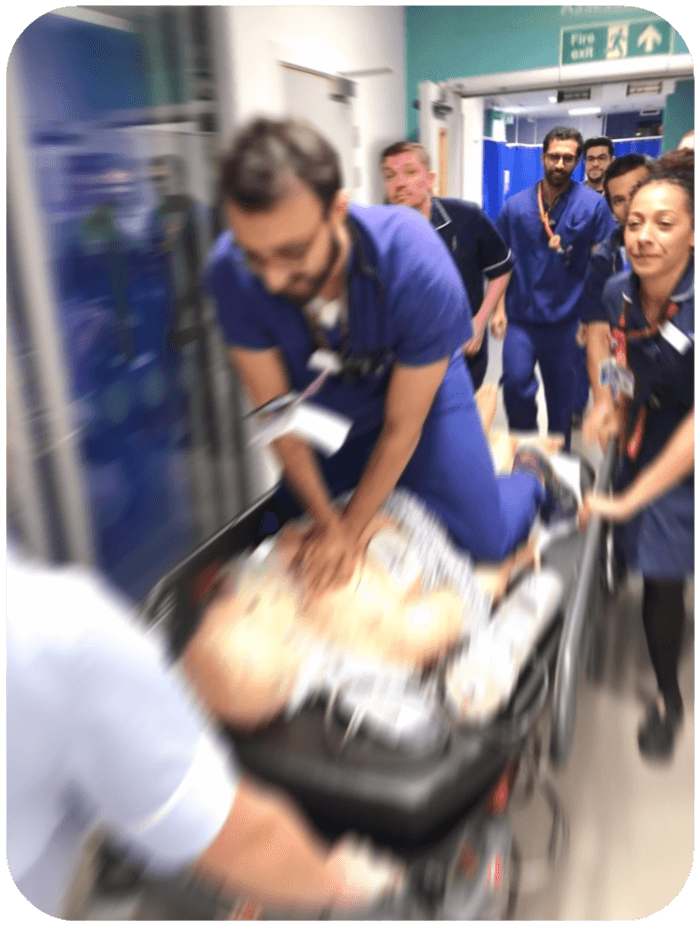Burnout in Emergency Medicine:
A Personal Perspective
Sunny Jutla
Almost three years into my role as an Emergency Medicine (EM) consultant, with over a decade in the specialty, I still feel closely connected to my junior and senior colleagues across all of the interprofessional staff groups.
We work side by side in a relentless environment, driven by the shared goal of providing the best possible care for our patients. But behind the scenes, exhaustion, emotional strain, and burnout are becoming far too common. Having seen friends and colleagues struggle, I’m passionate about supporting my team, ensuring we bring out the best in each other while keeping patient care at our core.
What is Burnout?
Burnout is more than just tiredness. It’s the overwhelming emotional, mental, and physical exhaustion that creeps in after prolonged stress. In Emergency Medicine, this manifests as emotional detachment (depersonalisation), a feeling of reduced personal achievement, and sheer exhaustion.
A 2023 study by the Royal College of Emergency Medicine (RCEM) highlighted that staff burnout is now one of the greatest risks to patient safety, as exhaustion directly impacts decision-making and performance (RCEM, 2023).
Why does Burnout happen?
Burnout isn’t just about long shifts and a high workload – though these play a massive role. It’s the emotional intensity of our work, the moral distress of not always being able to provide the care we want due to system pressures, and the expectation to keep going regardless. A survey by the Medical Defence Union found that one in three NHS doctors feel so exhausted their ability to treat patients is affected (MDU, 2025).
Other key contributors include:
Understaffing and demand pressures
The RCEM warns that chronic staff shortages lead to unmanageable workloads and unsafe conditions.
Compassion fatigue
Constant exposure to trauma and suffering takes a psychological toll.
Lack of recovery time
Many of us struggle to disconnect after shifts, making it hard to recharge.
Bureaucratic overload
Admin duties eat into our time, leaving us feeling ineffective.
What can we do?
It’s easy to feel powerless, but small steps can make a real difference:
1. Speak Up and Support Each Other
Creating a culture where it’s okay to talk about struggles is crucial. Checking in with colleagues, normalising discussions about wellbeing, and seeking peer support can be powerful tools (SOM, 2023).
2. Set Boundaries
We give so much to our patients, but we can’t pour from an empty cup. Taking breaks, properly switching off after shifts, and using leave days are vital.
3. Build Resilience, Not Just Endurance
Resilience is about having strategies to manage stress – not just pushing through. Simple things like mindfulness, exercise, or having a non-medical hobby help maintain balance.
4. Push for Structural Change
This isn’t just about individual coping strategies; systemic change is needed. The RCEM continues to advocate for safer staffing levels and better support structures. We can play our part by speaking up, engaging with hospital wellbeing initiatives, and mentoring junior colleagues.
5. Access Professional Support
Seeking help is a strength, not a weakness. Resources like the Practitioner Health Programme (PHP, 2025) offer confidential support for NHS staff. The BMA’s wellbeing services (BMA, 2025) and NHS Staff Support Programme (NHS England, 2024) are also valuable resources.
References:
Royal College of Emergency Medicine (2023). Burnout and Retention Crisis in Emergency Medicine
Medical Defence Union (2025). One in Three NHS Doctors Report Severe Exhaustion
Society of Occupational Medicine (2023). Burnout in Healthcare: Risk Factors and Solutions
Practitioner Health Programme (2025). Support for NHS Staff Mental Wellbeing
British Medical Association (2025). Wellbeing and Support for Doctors
NHS England (2024). Supporting NHS Staff Wellbeing
Final Thoughts
I love my job. I love the teamwork, the unpredictability, and the privilege of being there for patients when they need us most. But we can’t ignore the reality that many of us are running on empty.
Burnout isn’t inevitable. By looking out for each other, setting realistic expectations, and pushing for meaningful change, we can create a healthier working environment – for ourselves, our colleagues, and ultimately, our patients.
Page Contributors
Dr Sunny Jutla
Consultant in Emergency Medicine, Lead for EM3
Tom Brown
Website Designer
Jake Fudge
Multimedia Technologist





